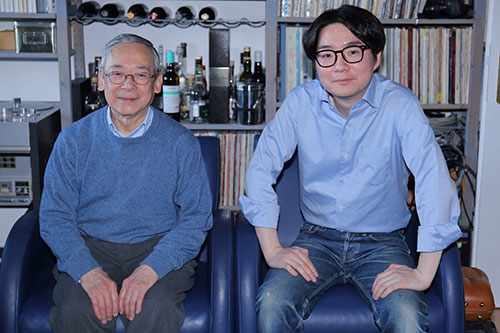Interview with Monsieur Delétraz aka darTZeel – part 1

Then I saw a job ad in the newspaper about to work for the city of Geneva as a civil servant. I got the job and was in charge to get the first portable computers for the 80 politicians of Geneva. And I was in responible for choosing the computer model. Then I became the 'guru 'because when the policians had a problem, they called me. At the time we had Windows 3.1 oder 3.1.1. It was a long time ago. I worked for the city of Geneva for eight years, but my my passion grew stronger and stronger: I wanted to build amplifiers. And so I never stopped thinking about my project. I tried, I failed, I tried again and failed again. So I was happy to have this job in the city because we had to have something to eat the end of the month.

It took me 16 years in total long to think about my first amplifier. In 1999 I built a prototype of the first darTZeel amplifier, it was called Model Zero. It was very huge because I didn't know which size I need inside. So I made it bigger than I needed. Now it's still there and when you look inside, it's almost empty. When I switched on the amplifier for the first time, I was afraid it would burst into flames. But everything was fine. I remember my son coming into the basement and me hugging him and saying, ‘It's working. It's working.’ I was so happy. That was 1999, and then I started to just enjoy my first creation.

Friends came to listen to it and said: “You can't make only one. You have to make one for me and for me and for me. Because we want it.” “Okay, guys.” Well, at that time it was quite complicated because we didn't have all these modern programmes to do drawings and stuff. At the time I didn't have the means to use AutoCAD, but there was a little software for designing called AutoSketch, which was derived from AutoCAD, but for beginners. To design the shape, all the electronics, the mechanics and everything else for this amplifier took me maybe two to three years.
-
Andante-Largo-Chef Suzuki san zu Besuch
Mika Dauphins Drei H Vertrieb hat eine neue Marke in sein Portfolio aufgenommen: Andante Largo mit seinen Racks, Spike-Aufnahmen und einem Kontaktverbesserer. Wie könnte man die Produkte besser kennenlernen als bei einem Besuch von Inhaber Suzuki san und seinem Sales Manager Kai Endo im heimischen Hörraum? An einem Freitagabend schaute Thomas Heckel, der Drei H in Süddeutschland vertritt, in Gröbenzell vorbei und stellte mir die beiden Japaner vor. Das Trio hatte auch jede Menge Taschen…07.03.2025 -
WestminsterLab Omne: Premiere in Hamburg
IAD, der deutsche Vertrieb von WestminsterLab, hatte eine Weltpremiere im Vorfeld der Norddeutschen Hifi-Tage angekündigt: Firmenchef Angus Leung würde aus Hong Kong anreisen und seine neuste Kreation, den Vollverstärker Omne, im Hifi-Studio Wisseling High End vorstellen. Sehen konnte man den Omne, hören leider noch nicht. Nachdem die geladenen Gäste die Möglichkeit erhalten und größtenteils wahrgenommen hatten, die beeindruckenden Räumlichkeiten in der Große Bleichen 34 mit den ebenso beeindruckenden Hifi- und Heimkinoinstallationen zu besichtigen, begann Angus…03.02.2025 -
Ein wenig Raumakustik
Auch wenn man sich über 30 Jahre beruflich mit Hifi beschäftigt, ist man vor Überraschungen nicht gefeit. Tauscht man eine Komponente für einen Test in der stimmig spielenden Kette aus, ist das eben ein Teil des Jobs und man muss auf einiges gefasst sein. Diesmal wollte ich aber nur ein bisschen aufräumen – mit ungeahnten akustischen Folgen. Natürlich habe ich ein wenig zur klanglichen Optimierung meines Hörraums getan: So hängen an den Wänden das ein…30.12.2024 -
AIM Kabel: Interview mit Akira Oshima und Johnny Lee
Bei der Verteilung von Kabeltests duckt sich Roland Dietl gern mal weg, was bei den AIM Ethernet-Kabeln aber nicht klappte. Dann beeindruckten sie ihn derart, dass er den Artikel über AIMs Top-USB-Kabel selbst initiierte – und sie später erwarb. Auf der Messe in Wien hatte ich die Gelegenheit, mehr über den Japanischen Kabelhersteller zu erfahren. Wenn sich ein nicht gerade als Kabel-affin bekannter schreibender Kollege – und darüberhinaus auch Helmut Baumgartner, der die Strippen nach…20.12.2024 -
High End Wien 26
Im kommenden Jahr wird noch einmal alles so sein, wie es war. Zumindest, was die wichtigste Messe unserer Branche angeht, die High End in München. Das wird dann die 21. Messe dort sein, nach ebenso vielen Veranstaltungen zuvor, einmal in Düsseldorf und danach in Frankfurt. Nach der magischen Zahl 42 geht es dann im Austria Center Vienna weiter. Am besten wäre es, man beginnt in Vorbereitung der High End in Wien schon heute mit leichtem…06.12.2024 -
Interview mit Jean-Pascal Panchard – Teil 2
Nach den Ausführungen zu seinem beruflichen Werdegang und einigen Stenheim-Modellen in Teil eins wird Jean-Pascal Panchard auch hier noch über das ein oder andere Modell aus dem Portfolio sprechen, bevor er Fragen zur internationalen Aufstellung der Firma, dem Audio-Club und seinen Lieblings-Medien für Tests und den privaten Hörgenuss beantwortet. Als Jean-Pascal Panchard Stenheim erwarb, hatte man lediglich die Alumine Two mit der optional zu ergänzenden Basssektion im Angebot. Um der Marke internationale Beachtung zu verschaffen,…25.11.2024
© 2025 | HIFISTATEMENT | netmagazine | Alle Rechte vorbehalten | Impressum | Datenschutz


























 |
|






























































































